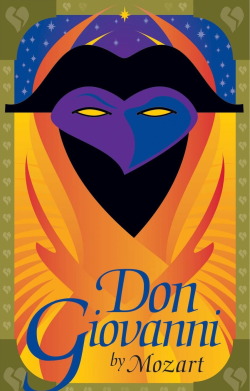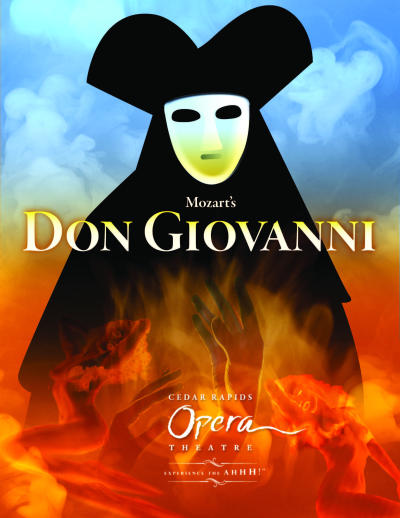Mozart's Don Giovanni

Don Giovanni is an opera in two acts with music by Wolfgang Amadeus Mozart to an Italian libretto by Lorenzo Da Ponte.
Its subject is a centuries-old Spanish legend about a libertine as told by playwright Tirso de Molina in his 1630 play El burlador de Sevilla y convidado de piedra. It is a dramma giocoso blending comedy, melodrama and supernatural elements (although the composer entered it into his catalogue simply as opera buffa).
It was premiered by the Prague Italian opera at the National Theater (of Bohemia), now called the Estates Theatre, on 29 October 1787.
Don Giovanni is regarded as one of the greatest operas of all time and has proved a fruitful subject for commentary in its own right; critic Fiona Maddocks has described it as one of Mozart's "trio of masterpieces with librettos by Da Ponte".
Its subject is a centuries-old Spanish legend about a libertine as told by playwright Tirso de Molina in his 1630 play El burlador de Sevilla y convidado de piedra. It is a dramma giocoso blending comedy, melodrama and supernatural elements (although the composer entered it into his catalogue simply as opera buffa).
It was premiered by the Prague Italian opera at the National Theater (of Bohemia), now called the Estates Theatre, on 29 October 1787.
Don Giovanni is regarded as one of the greatest operas of all time and has proved a fruitful subject for commentary in its own right; critic Fiona Maddocks has described it as one of Mozart's "trio of masterpieces with librettos by Da Ponte".

Several Versions of the Complete Opera Below
Subtitles: 🇮🇹 🇬🇧 🇺🇸 🇫🇷 🇨🇦
ITALIANO (CC) – ENGLISH (CC) – FRANÇAIS (intégré dans la vidéo).

Don Giovanni 🎼 Teatro alla Scala
Peter Mattei, Bryn Terfel
👇 ♪ English Subtitles ♪ 👇
Peter Mattei, Bryn Terfel
👇 ♪ English Subtitles ♪ 👇
Peter Mattei - Don Giovanni
Bryn Terfel - Leporello
Kwangchul Youn - Il Commendatore
Anna Netrebko - Donna Anna
Giuseppe Filianoti - Don Ottavio
Barbara Frittoli - Donna Elvira
Anna Prohaska - Zerlina
Stefan Kocan - Masetto
Conductor: Daniel Barenboim
Director: Robert Carsen * Teatro alla Scala, 2011

Don Giovanni 🎼 Mozart
Opéra Royal du Château de Versailles
Opéra Royal du Château de Versailles
Jamais démenti depuis la Première à l'Opéra de Prague en 1787, "Don Giovanni" est un opéra plein de péripéties écrit par Mozart. Dans le rôle principal, Robert Gleadow emmène le spectateur dans les aventures rocambolesques de ce noble séducteur.
👇 ♪ 📽 ♪ 👇

Mozart 🎼 Don Giovanni
Herbert von Karajan, Salzburg Festival, 1987
👇 ♪ 📽 ♪ 👇
Herbert von Karajan, Salzburg Festival, 1987
👇 ♪ 📽 ♪ 👇
Don Giovanni“ from the Salzburg Festival in 1987. One of the last opera productions under the baton of Herbert von Karajan, directed by Michael Hampe. The entire performance in best possible quality is presented by the “Eliette und Herbert von Karajan Institut”.
Wolfgang Amadeus Mozart (1756 – 1791)
“Don Giovanni”, dramma giocoso K. 527
Don Giovanni: Samuel Ramey
Il Commendatore: Paata Burchuladze
Donna Anna: Anna Tomowa-Sintow
Donna Elvira: Júlia Várady
Don Ottavio: Gösta Winbergh
Leporello: Ferruccio Furlanetto
Masetto: Alexander Malta
Zerlina: Kathleen Battle
Konzertvereinigung Wiener Staatsopernchor
Wiener Philharmoniker
Conductor: Herbert von Karajan
Stage direction: Michael Hampe
Set: Mauro Pagano
Wolfgang Amadeus Mozart (1756 – 1791)
“Don Giovanni”, dramma giocoso K. 527
Don Giovanni: Samuel Ramey
Il Commendatore: Paata Burchuladze
Donna Anna: Anna Tomowa-Sintow
Donna Elvira: Júlia Várady
Don Ottavio: Gösta Winbergh
Leporello: Ferruccio Furlanetto
Masetto: Alexander Malta
Zerlina: Kathleen Battle
Konzertvereinigung Wiener Staatsopernchor
Wiener Philharmoniker
Conductor: Herbert von Karajan
Stage direction: Michael Hampe
Set: Mauro Pagano

Mozart - Don Giovanni (1787)





.gif)


No comments:
Post a Comment